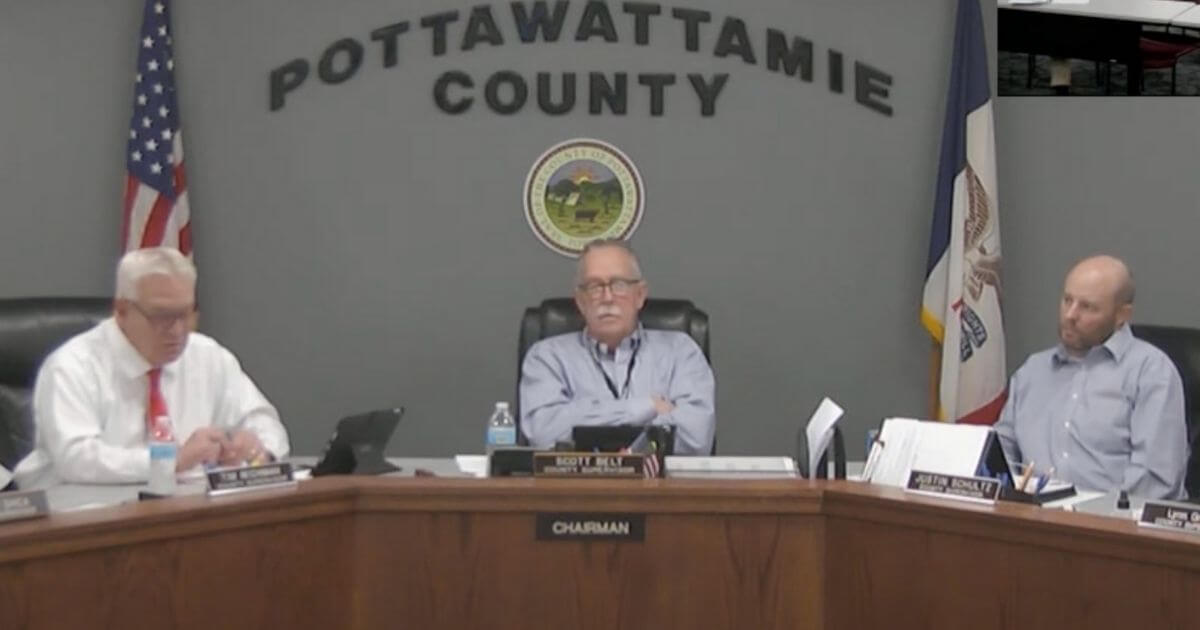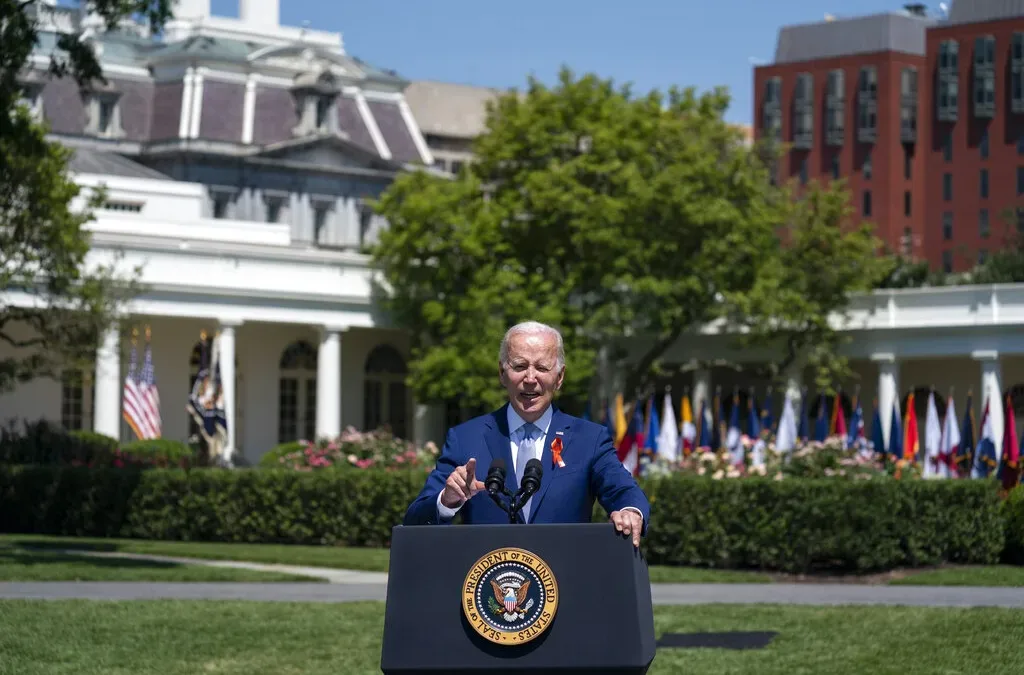
Screenshot from Pott. County Supervisors YouTube
Pottawattamie County residents want a bigger say in how the county uses federal COVID relief dollars after the board of supervisors used $2 million to purchase a ski hill without public input.
Calling themselves the Concerned Citizens of Pottawattamie County, the group made up of residents and activists has hosted town halls in Oakland and Avoca. A final town hall is set for May 4 in Council Bluffs.
The purpose of the meetings is for residents and elected officials—city and county—to discuss how to spend Pottawattamie County’s second American Rescue Plan Act (ARPA) payment, which will be about $9 million.
With the first $9 million payment, about $4 million of it went to a new public health facility in Council Bluffs and $2 million went toward buying the Mt. Crescent Ski Area outside of Honey Creek, which has drawn local concern. The total sale price of the 100-acre ski property which also included two homes was $3.5 million. The other $1.5 million for the ski hill purchase came from the Iowa West Foundation, a private nonprofit that receives its funding via investments and proceeds from Council Bluffs’ three casinos.
[inline-ad id=”0″]
Why it’s an issue
Jeff Shudak, a Council Bluffs resident and labor organizer, is running for one of three open seats on the Pottawattamie County Board of Supervisors. Shudak, a Democrat, told Starting Line he was motivated to run because of what went down with the ski hill purchase. The current board is made up of all Republican members.
“I’m not totally opposed and saying this is a bad idea,” Shudak said of the purchase. “What I am saying is this COVID relief money [should] help frontline workers, and worker housing, and small businesses that have took the brunt of this pandemic. This money for the federal government was instructed to help those folks out, not necessarily to buy ski hills.”
Fran Parr, a Council Bluffs resident, told Starting Line one of her biggest issues with the purchase was the lack of transparency behind it.
“There was no indication of it anywhere in the 2021 open session notes,” Parr said.
As Parr noted, none of the 2021 open session minutes for the Pottawattamie County Board of Supervisors meetings give any hint about the ski hill purchase. The decision to buy the property was made during the Dec. 21, 2021, board meeting after a nearly 30-minute closed session.
During the closed session, supervisor Justin Schultz—who later admitted he played a key role in negotiating the purchase of the ski hill from former owners Korby and Samantha Fleischer—suggested ways the board could hide its intent to purchase the recreation attraction from the public.
“You don’t lie to your wife but you also don’t volunteer information that you don’t need to,” Schultz said.
[inline-ad id=”2″]
A recording of the Dec. 21 closed session meeting was released after resident requests. The board agreed that when it came back into open session, it would authorize then-board chair Scott Belt to sign off on the purchase agreement. The Fleischers agreed to the offer on Dec. 22 and Belt signed on behalf of the county at an unrecorded Dec. 30 board meeting.
The agenda for the Dec. 30 meeting said “Discussion and/or decision to approve and authorize Board to sign Resolution No. 125-2021 entitled: RESOLUTION authorizing purchase of property and designating Board Chair as authorized representative to sign necessary document to effectuate said purchase.”
It wasn’t until the minutes of the Dec. 30 meeting that residents formally found out what the county was purchasing; however, the minutes don’t specify how much the county paid or where the funds were coming from.
“It caught everybody by surprise when this happened,” Parr said. “So that’s item one, it’s kind of the way the process and however this thing was [done]. We don’t know how long it was under consideration for—there’s no records of that—there’s only the open record of the resolution, the last resolution of the year, and the last day of the year saying we’re buying this.”
‘Big Picture’
[inline-ad id=”3″]
On March 4, supervisors Belt and Schultz met virtually with residents who were concerned about the secrecy surrounding the ski hill purchase and future usage of ARPA dollars.
During that March 4 meeting, a recording of which was provided to Starting Line, Schultz tried to explain the deal’s timeline.
“The idea of purchasing Mt. Crescent happened long before I was on the board,” Schultz, who joined the five-person board in 2015, told the group.
Pottawattamie County operates the 1,200-plus acre Hitchcock Nature Center outside of Honey Creek. It is located just north of Mt. Crescent. The ski hill opened in 1961 and has been owned and operated by the Fleischer family since 2008.
County officials have long desired to link Hitchcock and Mt. Crescent, according to Schultz. Pottawattamie County Conservation Director Mark Shoemaker told Sioux Falls, South Dakota-TV station KELO earlier this year that the county had eyed the ski hill for at least 22 years.
“The plans to expand Hitchcock go far beyond Mt. Crescent and that acquisition—well, well beyond that,” Schultz said during the March 4 meeting. “We’re talking probably a couple thousand acres more when you look at the whole big picture.”
Schultz said it’s not affordable to do all of that at once, but there are mechanisms in place including some landowners deeding their property to the county when they die, others offering the county first right of refusal, and more to make that come to fruition.
Previous Deal
[inline-ad id=”4″]
The county came close to an agreement with the Fleischers “three or four years” ago, but the negotiations fell through.
“I don’t know the best way to put this, you know, to sound politically [correct] but I mean it just went to hell in a handbasket really fast,” Schultz said during the March 4 meeting.
According to Schultz, things became derailed when the Iowa West Foundation offered to provide matching funds to buy Mt. Crescent and a foundation board member leaked the information to Korby Fleischer that Iowa West was going to be involved.
The Iowa West Foundation has given away more than $400 million in grants since 2016 and, according to its latest tax filing, still has nearly $400 million in total assets.
[inline-ad id=”5″]
“Well, magically, his price tag started going up and so it got to the point where we just said ‘no deal, we’re not doing this. It’s too expensive. We can’t make this happen, this just doesn’t make sense for us,’’” Schultz said on March 4 in regards to the previous negotiation with Fleischer.
A few years after the talks ended, Schultz said Fleischer approached the county to see about selling the ski hill.
“I took that on, on behalf of the board,” Schultz said.
When was the new deal made?
Schultz said he and Fleischer met several times to discuss the ski hill including once in Seattle and another time in Vail, Colorado, where Fleischer owns another ski lodge. According to Schultz’s Facebook page, he took a family trip to Washington state in July 2021, about six months before the county closed on the Mt. Crescent deal. He’s also marked absent from the roll call of the July 19, 2021, board meeting, according to the meeting minutes.
During his first meeting with Fleischer in Crater Lake—no date was specified—Schultz said he told the ski hill owner to give the county a price. Two months after that meeting, Fleischer asked for $4.5 million, while Schultz made a counteroffer of $2.8 million, the agreed-upon amount before the original deal fell through.
“He said, ‘You’re going to have to do better than that,’” Schultz said. “Well, we finally decided—this is before ARPA—that $3 million was our bottom line. We’re not moving, not budging from that.”
[inline-ad id=”0″]
Schultz said the plan was to use money the county set aside from its land fund to pay for the ski hill. The land fund likely refers to the Conservation Land Acquisition and Development line item in the 2021-22 fiscal year Pottawattamie County budget, which has about $2.2 million earmarked.
The land fund money was slated to go toward a $12 million remodel project for the Pottawattamie County Courthouse, according to Schultz; however, that changed once the city of Council Bluffs agreed to designate the courthouse as an urban renewal district.
That designation allowed the county to bond for the courthouse project and freed up the land funds so they could then go toward the ski hill, Schultz said on March 4. However, this version of events creates more questions as to when exactly Pottawattamie County formally started negotiating for Mt. Crescent.
According to meeting minutes, Pottawattamie County approved the courthouse urban renewal district on March 2, 2021. President Joe Biden signed ARPA into law on March 11, 2021, and the first payments went out on May 10, 2021.
[inline-ad id=”1″]
For Schultz’s timeline to pan out, it would mean that he negotiated a final deal with Fleischer before March 2, 2021, which then raises the question of why the July 2021 meeting in Seattle was necessary or why the board discussed the property last year in August and October closed session meetings or why wasn’t the deal formalized until December 2021.
A voicemail was left for Schultz’s extension at the courthouse on Tuesday night. A second voicemail was left on his personal cellphone on Wednesday morning.
‘We washed the government’s money’
Parr has also spent her free time trying to figure out when the county made the deal and even hand drew a timeline to keep track.
“Why do I have to go and waste time and uncover where they buried the records of this ski hill purchase,” she said.
Shudak, the Democratic supervisor candidate, has been attending the ARPA town halls. He said he wants to hear directly from people as to what the county should do with its next ARPA installment.
“Pottawattamie County is never going to have $18 million dollars again and they’ve already spent half of it,” he said.
Besides the mystery of how and when the ski hill deal was made, another criticism some residents had was the county using COVID relief dollars for a ski hill.
“We’re really proud of that purchase and I know that people can argue and say, ‘Well, this is COVID recovery, you can’t use it for that purpose,’ and it’s like, well, you’re right, but we lost a substantial amount of tourism too,” Schultz said during the March 4 meeting.
According to the US Treasury Department’s final rule on ARPA spending, “travel, tourism, and hospitality” impacted by COVID-19 are eligible uses of the funds as are parks and economic development, which makes a good case that Mt. Crescent would qualify.
When wrapping up his March 4 explanation on how and why the county purchased Mt. Crescent, Schultz went back to the land fund.
“The money is still in the land fund that was going to be used for it,” Schultz said, referring to the ski hill. “But that money is what I’d say is more available or less restricted money. So you can kind of look at it like we washed the government’s money in some way.
“That’s probably not the best way to explain it, but that’s kind of what we did.”
by Ty Rushing
04/27/22
Iowa Starting Line is part of an independent news network and focuses on how state and national decisions impact Iowans’ daily lives. We rely on your financial support to keep our stories free for all to read. You can contribute to us here. Also follow us on Facebook and Twitter.
[inline-ad id=”0″]
Politics

Biden announces new action to address gun sale loopholes
The Biden administration on Thursday announced new action to crack down on the sale of firearms without background checks and prevent the illegal...

Biden cancels student loan debt for 2,690 more Iowans
The Biden administration on Friday announced its cancellation of an additional $7.4 billion in student debt for 277,000 borrowers, including 2,690...
Local News

No more Kum & Go? New owner Maverik of Utah retiring famous brand
Will Kum & Go have come and gone by next year? One new report claims that's the plan by the store's new owners. The Iowa-based convenience store...

Here’s a recap of the biggest headlines Iowa celebs made In 2023
For these famous Iowans, 2023 was a year of controversy, career highlights, and full-circle moments. Here’s how 2023 went for the following Iowans:...





